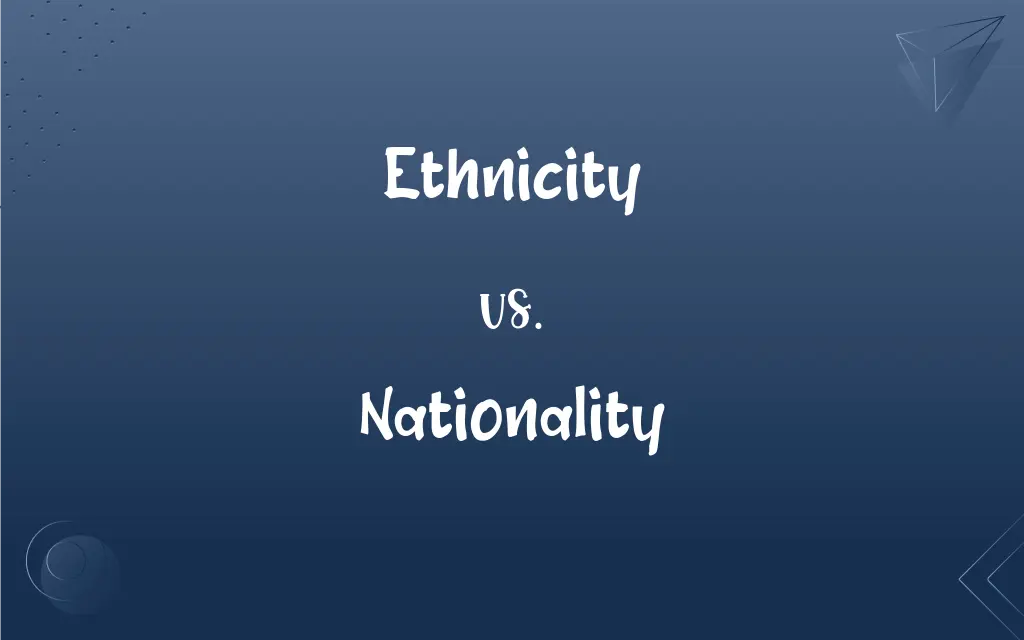Ethnicity vs. Nationality: What's the Difference?
Edited by Aimie Carlson || By Harlon Moss || Updated on October 25, 2023
Ethnicity refers to shared cultural, linguistic, or ancestral traits; nationality denotes one's membership or affiliation to a specific nation or state.

Key Differences
Ethnicity and nationality are both concepts related to identity, but they serve to categorize individuals in different ways. Ethnicity revolves around shared cultural, linguistic, or ancestral ties. This can encompass traditions, language, history, or ancestry that a group shares, irrespective of their global location. Conversely, nationality ties an individual to a specific nation or state, often linked to legal and geopolitical factors.
Ethnicity often highlights the richness and diversity of human societies. For instance, within a single country, numerous ethnicities might coexist, each celebrating its unique traditions, foods, or languages. Nationality, meanwhile, is more aligned with legal parameters, citizenship, and geopolitical boundaries. It relates to the country one identifies with, either by birth or by naturalization.
While ethnicity can cross national boundaries (e.g., the Kurdish people are spread across several countries), nationality is typically confined within the borders of a single country. A person's ethnicity remains the same irrespective of the country they might move to, while their nationality can change if they become a citizen of another country.
Moreover, ethnicity is often tied to deeper, ancient roots of a community, emphasizing shared traditions, beliefs, and heritage. Nationality, however, is a more modern construct, focusing on the connection between individuals and states, characterized by shared legal rights, responsibilities, and patriotism.
It's worth noting that while both ethnicity and nationality contribute to an individual's sense of identity, they are not mutually exclusive. A person can be proud of their ethnic heritage while also being devoted to their country of nationality, illustrating the multifaceted nature of identity.
ADVERTISEMENT
Comparison Chart
Definition
Refers to shared cultural, linguistic, or ancestral traits.
Denotes affiliation to a specific nation or state.
Basis
Cultural, linguistic, ancestral.
Geopolitical, legal.
Boundaries
Can transcend national borders.
Typically confined to a specific country.
Changeability
Remains consistent irrespective of location.
Can change with citizenship change.
Historical Context
Often ancient, tied to traditions and heritage.
More modern, tied to the formation of states.
ADVERTISEMENT
Ethnicity and Nationality Definitions
Ethnicity
Ethnicity encompasses shared linguistic traits.
The uniqueness of their dialect indicated a distinct ethnicity.
Nationality
Nationality is associated with legal citizenship.
He changed his nationality after living in Canada for five years.
Ethnicity
Ethnicity can be broader than national boundaries.
Despite living in different countries, they shared the same ethnicity.
Nationality
Nationality is tied to geopolitical entities.
Despite ethnic similarities, they held different nationalities.
Ethnicity
Ethnicity refers to a group's shared ancestry.
Her ethnicity could be traced back to ancient tribes of the region.
Nationality
Nationality often involves shared civic responsibilities.
Voting is a duty and right associated with his nationality.
Ethnicity
Ethnicity relates to shared cultural characteristics.
The festival celebrated the diverse ethnicity of the city.
Nationality
Nationality can be acquired or innate.
She was born in France but acquired U.S. nationality later in life.
Ethnicity
Ethnicity emphasizes shared traditions and beliefs.
Their dances and songs reflected their rich ethnicity.
Nationality
Nationality signifies one's affiliation to a country.
Her nationality was American, but her ethnicity was Irish.
Ethnicity
Ethnic character, background, or affiliation.
Nationality
The status of belonging to a particular nation by origin, birth, or naturalization.
FAQs
How is ethnicity different from race?
Ethnicity emphasizes cultural, linguistic, or ancestral ties, while race is often associated with physical characteristics.
Can a person belong to multiple ethnicities?
Yes, many individuals identify with multiple ethnic backgrounds.
Does ethnicity change when you move countries?
No, ethnicity remains constant regardless of location.
Is nationality always determined by birthplace?
Not always. Nationality can be determined by birth, descent, or legal processes.
Can nationality be changed?
Yes, nationality can change through processes like naturalization.
Which is broader, ethnicity or nationality?
Ethnicity can span multiple countries, while nationality is country-specific.
Can ethnicity influence cuisine and art?
Yes, ethnicity often plays a significant role in shaping cultural expressions like cuisine and art.
How do countries determine nationality?
Countries have varied laws, often considering birthplace, descent, marriage, or residency.
Can someone have multiple nationalities?
Yes, some countries allow dual or multiple nationalities.
Is nationality a modern concept?
Relatively, nationality arose with the formation of modern nation-states.
How is ethnicity represented in census data?
Ethnicity is often categorized based on shared cultural or ancestral traits.
How do migration and globalization impact nationality?
Migration can lead to changes in nationality, while globalization often blurs the strict lines of national identity.
Is nationality linked to legal rights?
Yes, nationality often determines legal rights and responsibilities in a country.
Is ethnicity hereditary?
Yes, ethnic traits and ties can be passed down through generations.
Why is ethnicity significant in anthropology?
Ethnicity provides insights into cultural, linguistic, and ancestral evolution and interactions.
Do legal documents display nationality?
Yes, documents like passports and IDs often indicate an individual's nationality.
Can shared holidays indicate ethnicity?
Often, shared holidays and festivals can be indicators of a common ethnicity.
Does nationality determine language?
Not always. Many countries have multiple languages spoken across various ethnic groups.
Can a country have multiple nationalities?
Typically, a country has one nationality, but many ethnicities may reside within it.
Are ethnicity and nationality mutually exclusive?
No, one can identify with a specific ethnicity while having a different nationality.
About Author
Written by
Harlon MossHarlon is a seasoned quality moderator and accomplished content writer for Difference Wiki. An alumnus of the prestigious University of California, he earned his degree in Computer Science. Leveraging his academic background, Harlon brings a meticulous and informed perspective to his work, ensuring content accuracy and excellence.
Edited by
Aimie CarlsonAimie Carlson, holding a master's degree in English literature, is a fervent English language enthusiast. She lends her writing talents to Difference Wiki, a prominent website that specializes in comparisons, offering readers insightful analyses that both captivate and inform.































































